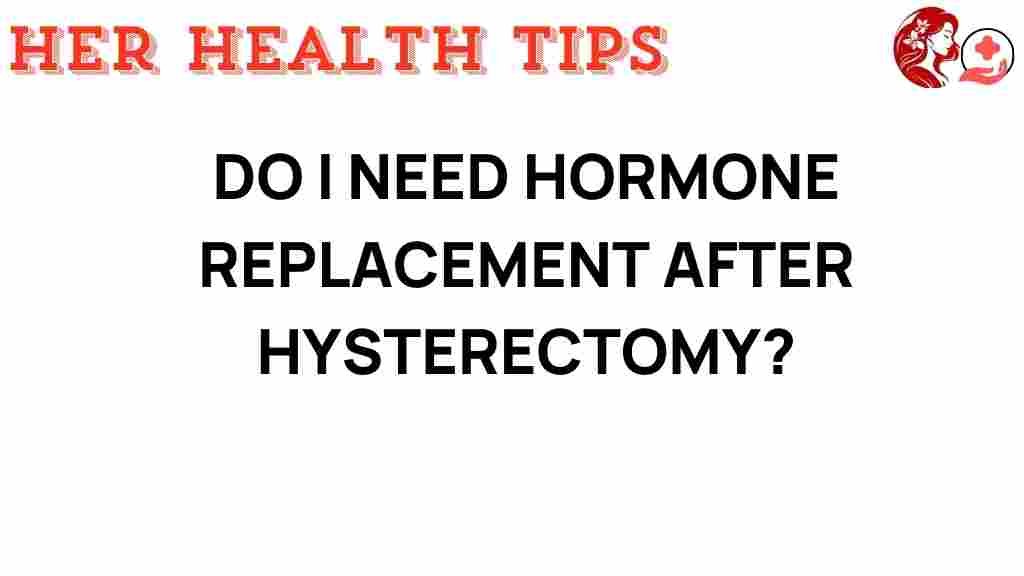Hysterectomy is a common surgical procedure for women, often performed to treat various conditions such as fibroids, endometriosis, or cancer. However, the decision to undergo a hysterectomy raises important questions, especially regarding hormone replacement. In this article, we will explore the implications of hormone replacement therapy (HRT) after a hysterectomy, its necessity for women’s health, and how it can impact recovery and overall well-being.
Understanding Hysterectomy
A hysterectomy involves the surgical removal of the uterus. Depending on individual health needs, it may also include the removal of the cervix, ovaries, and fallopian tubes. There are several types of hysterectomies:
- Partial or subtotal hysterectomy: Removal of the uterus while leaving the cervix intact.
- Total hysterectomy: Removal of the uterus and cervix.
- Radical hysterectomy: Removal of the uterus, cervix, surrounding tissues, and possibly the ovaries and fallopian tubes.
Each type of hysterectomy can have different effects on a woman’s hormonal balance, especially if the ovaries are removed, leading to a sudden onset of menopause.
The Role of Hormones in Women’s Health
Hormones play a crucial role in a woman’s body, influencing everything from mood and energy levels to reproductive health. The primary hormones involved are:
- Estrogen: The main female sex hormone, critical for reproductive and overall health.
- Progesterone: Regulates the menstrual cycle and supports pregnancy.
After a hysterectomy, especially if the ovaries are removed, a woman may experience a dramatic drop in these hormones, leading to symptoms of menopause such as:
- Hot flashes
- Night sweats
- Mood swings
- Vaginal dryness
- Sleep disturbances
This hormonal imbalance can significantly affect a woman’s quality of life, making hormone replacement therapy a consideration for many.
Is Hormone Replacement Necessary After Hysterectomy?
The necessity of hormone replacement after a hysterectomy depends on several factors:
- Type of hysterectomy: If the ovaries are removed (oophorectomy), the body will no longer produce estrogen, necessitating HRT to alleviate menopausal symptoms.
- Age: Younger women who undergo hysterectomy may benefit more from HRT due to the sudden onset of menopause.
- Personal health history: Women with a history of hormone-sensitive cancers may need to avoid HRT.
Consulting with a healthcare provider is essential to evaluate individual circumstances and determine the best course of action.
Benefits of Hormone Replacement Therapy
For many women, HRT can provide relief from menopausal symptoms and improve overall well-being. The benefits of hormone replacement include:
- Relief from symptoms: Effective in reducing hot flashes, night sweats, and mood swings.
- Bone health: Estrogen helps maintain bone density, reducing the risk of osteoporosis.
- Cardiovascular health: HRT may have protective effects on heart health, though this is still being studied.
- Improved quality of life: Many women report a better emotional and physical state with HRT.
Types of Hormone Replacement Therapy
There are different forms of HRT available, including:
- Estrogen therapy: Often recommended for women who have had a hysterectomy, as they do not need progesterone.
- Combination therapy: For women with a uterus, a combination of estrogen and progesterone is used to protect the uterine lining.
- Bioidentical hormones: These are chemically identical to the hormones produced by the body and may be derived from plant sources.
Step-by-Step Process of Considering HRT
If you are considering hormone replacement therapy after a hysterectomy, follow these steps:
- Consult Your Healthcare Provider: Discuss your symptoms, medical history, and concerns. A thorough evaluation is crucial.
- Evaluate Your Options: Understand the different types of HRT available and discuss which may be suitable for you.
- Consider Risks and Benefits: Ask about potential side effects and weigh them against the benefits of therapy.
- Monitor Your Health: Once you start HRT, regular follow-ups with your healthcare provider are vital to assess effectiveness and make necessary adjustments.
Post-Surgery Care and Recovery
Proper post-surgery care is essential for recovery after a hysterectomy. Here are some tips to consider:
- Follow Medical Advice: Adhere to your doctor’s post-operative instructions, including restrictions on physical activity.
- Manage Pain: Use prescribed medications as directed to manage discomfort.
- Stay Hydrated and Nourished: A balanced diet and adequate hydration aid recovery.
- Monitor Symptoms: Keep track of any new or worsening symptoms and report them to your healthcare provider.
- Emotional Support: Seek support from friends, family, or professionals as needed to deal with emotional changes.
Troubleshooting Tips for Hormone Replacement Therapy
While HRT can be beneficial, some women may experience issues. Here are troubleshooting tips:
- Adjusting Dosage: If side effects occur, consult your doctor to discuss adjusting the dosage or changing the type of therapy.
- Monitor Mood Changes: Keep a journal of mood fluctuations to identify patterns and discuss them with your provider.
- Consider Lifestyle Changes: Diet, exercise, and stress management techniques can complement HRT and improve symptoms.
- Regular Check-Ups: Schedule regular appointments to monitor your health and make necessary adjustments to your treatment plan.
Conclusion
Deciding on hormone replacement therapy after a hysterectomy is a personal choice that should be made in consultation with a healthcare provider. Understanding the implications of hormonal changes post-surgery and how they affect women’s health is crucial. While HRT can provide significant benefits and improve quality of life, it is essential to weigh the risks and monitor your health regularly.
For further information on women’s health and hormone therapy, you can visit this resource to explore more about managing symptoms and improving your health after surgery.
Remember, every woman’s experience is unique, and being proactive in your healthcare can lead to a more balanced and fulfilling life post-hysterectomy.
This article is in the category Reproductive and created by HerHealthTips Team

3 thoughts on “Navigating Hormone Replacement: Is It Necessary After Hysterectomy?”